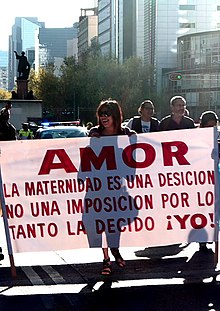User:JoePayne6467/Women on Waves
| This is the sandbox page where you will draft your initial Wikipedia contribution.
If you're starting a new article, you can develop it here until it's ready to go live. If you're working on improvements to an existing article, copy only one section at a time of the article to this sandbox to work on, and be sure to use an edit summary linking to the article you copied from. Do not copy over the entire article. You can find additional instructions here. Remember to save your work regularly using the "Publish page" button. (It just means 'save'; it will still be in the sandbox.) You can add bold formatting to your additions to differentiate them from existing content. |
Article Draft
[edit]Lead
[edit]
Women on Waves is a Dutch nongovernmental organization (NGO) focused on providing abortions and reproductive health care to women in locations where it is prohibited or restricted. It was founded in 1999 by Dutch physician Dr. Rebecca Gomperts.[1] Women on Waves provides services on a commissioned ship which takes patients into international waters after appointments are made prior to the ship's arrival. Gomperts has said that her motivation for starting Women on Waves was to reduce unsafe, illegally-performed abortions.[1] It is part of a global movement for abortion rights, which has gained international traction.[2] Today, access to abortion is a major focus of certain Dutch organizations and government initiatives.[3] In the Netherlands, abortion is legal up to the 24th week of pregnancy and covered by the Exceptional Medical Expenses Act or health insurers.[4]
The ship itself is a repurposed tugboat with containers stacked on it, emblazoned with the Women on Waves logo.[5]
According to Gomperts, the first time the ship sailed out, it was a Dutch ship leaving Dutch waters. This meant they could take abortion pills with them to give out in international waters.[6]

Article body
[edit]abortion and reproductive laws only extend as far as national borders, including nautical borders. Because of this, Women on waves makes use of added freedom in international waters.[7] The boat sails 20 miles from shore, and takes a day to perform its procedures.[1]
The United Nations Convention on the Law of the Sea (UNCLOS), a ship must sail under the flag of one nation and may not change it in a port of call, save in the case of a transfer of ownership.[2] this gives Women on Waves the status to sail under Dutch jurisdiction.
Women on waves represents part of the global move for reproductive rights. The ship has been used to test and challenge the limited reproductive rights in countries like Ireland and attempt to create more access to abortion.[7]
more than 9 out of 10 abortions worldwide occur in developing nations like the ones Gomperts and Women on Waves visit. Unsafe abortions in regions where it is outlawed or restricted are a leading cause of maternal death.[8]
There is a trend Dutch overseas involvement in reproductive rights/health, including in Indonesia,[9] a region previously colonized by the Netherlands. J.O Wiering cites an instance in her 2020 dissertation of a woman who claimed one of her main motivations for entering her field was seeing how restrictive conversations about abortion were during her time in Indonesia.[9]
Gomperts has faced considerable opposition to Women on Waves. The 2014 documentary Vessel shows anti-abortion protesters in Poland calling her a Nazi in a chant, and in Spain trying to tow the Women on Waves vessel back out to sea.[3]

Documentary
[edit]In 2014, 'Vessel', a documentary directed by Diana Whitten that centers on the organization Women on Waves, made its debut at the South by Southwest Film Festival in Austin, Texas, USA, where it won the Best Documentary Feature audience and special jury awards.[10] 'Vessel' was received fairly positively by critics and audiences. Courtney Small of Cinema Axis called it an "electrifying" look at Gomperts' operation[11] and Ben Kenigsberg of the New York Times called it an "unabashed work of advocacy."[12] The Hollywood Reporter's review said it was unlikely to change audience's opinions on abortion, but called it a moving film.[13] It has a Metacritic Metascore of 68.[14]
The film has garnered multiple other awards including the Audience Award for Documentary in Competition and a Special Jury Award for Political Courage.[15]
- ^ a b "Off campus login to access MacOdrum Library e-resources". proxy.library.carleton.ca. Retrieved 2023-11-04.
- ^ Rebouche, Rachel (2016-12). "Abortion Rights as Human Rights". Social & Legal Studies. 25 (6): 765–782. doi:10.1177/0964663916668391. ISSN 0964-6639.
{{cite journal}}: Check date values in:|date=(help) - ^ Zaken, Ministerie van Buitenlandse. "Dutch Development results Sexual and reproductive health and rights including HIV / AIDS (SRHR)". www.dutchdevelopmentresults.nl. Retrieved 2023-11-28.
- ^ Ministerie (2014-07-01). "Topics - Abortion - Government.nl". www.government.nl. Retrieved 2023-11-28.
- ^ Lambert‐Beatty, Carrie (2008). "Twelve Miles: Boundaries of the New Art/Activism". Signs. 33 (2): 309–327. doi:10.1086/521179. ISSN 0097-9740.
- ^ Urbina, Ian (Oct. 17, 2022). "From the Sea, Freedom | The Outlaw Ocean Podcast". The Outlaw Ocean Project. Retrieved 2023-11-24.
{{cite web}}: Check date values in:|date=(help) - ^ a b Gomperts, Rebecca (2002-01). "Women on Waves: Where Next for the Abortion Boat?". Reproductive Health Matters. 10 (19): 180–183. doi:10.1016/S0968-8080(02)00004-6. ISSN 0968-8080.
{{cite journal}}: Check date values in:|date=(help) - ^ https://www.womenonwaves.org/en/page/650/who-are-we
- ^ a b Wiering, Jelle Oscar (2020). Secular Practices: The Production of Religious Difference in the Dutch field of Sexual Health. [Groningen]: University of Groningen.
- ^ Vessel (2014) - Awards - IMDb, retrieved 2023-11-27
- ^ Small, Courtney (2014-04-24). "Hot Docs Review: Vessel". Cinema Axis. Retrieved 2023-11-27.
- ^ Kenigsberg, Ben (2015-01-09). "'Vessel,' Directed by Diana Whitten". The New York Times. ISSN 0362-4331. Retrieved 2023-11-27.
- ^ Staff, T. H. R. (2015-01-08). "'Vessel': Film Review". The Hollywood Reporter. Retrieved 2023-11-27.
- ^ "Vessel". www.metacritic.com. Retrieved 2023-11-27.
- ^ "HOME". VESSEL. Retrieved 2023-11-24.
